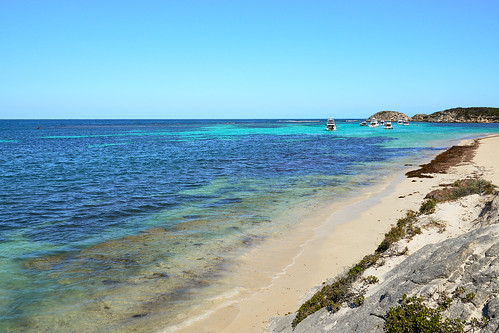Fireworks for All, One Day Only, in Australia’s Last Frontier
Australia #Australia

As fireworks lit up the three-mile stretch of coastline in the capital of Australia’s remote Northern Territory, a swath of grass along the beach went up in flames.
A few revelers used tree branches to beat down the blaze; one man poured water on the fire with one hand, clutching a beer in another. But most, having judged that the fire probably would not spread, were content to carry on setting off fireworks and waiting for firefighters to arrive to douse the conflagration, which they did after about 15 minutes. About three feet from the fire, close enough to feel its heat, a couple lit sparklers and danced with their two young children.
Welcome to Territory Day in the Northern Territory, the one time and place in mainland Australia where anyone can set off fireworks, no permits needed and no questions asked.
Down the beach from the grass fire, teenagers cheered on by their friends set off rockets — the kind designed to be put on the ground and lit — from their hands. Misfiring flares skidded along the sand, exploding in the water or among the crowds. A man staggered past, holding an upside-down beach chair over his head as protection.
“Heads up,” Michael Bonnett called, as a flare headed toward where he was lounging in lawn chairs in the sand with his wife, friends and children. Everyone ducked as it exploded about two feet away, showering them with sparks.
“That was a bad one,” Mr. Bonnett, 40, said cheerfully before calling out to a mate: “That nearly got ya!”
Such celebrations were once common across Australia, before states began to ban consumer fireworks from the 1960s onward. Now, the holdout is the Northern Territory, a handful of cities and towns situated within a vast, sparsely populated stretch from the heart of the country’s red outback to its northernmost tropics that some term Australia’s last frontier. (Tasmania also allows consumer fireworks one day a year, but a permit is required.)
Each year on July 1 in the Northern Territory, from 9 a.m. to 9 p.m., anyone 18 or older can buy fireworks, to be set off from 6 to 11 p.m.
Although the tradition was once a version of Guy Fawkes Day, celebrating Australia’s connection to Britain, it was changed in the 1980s to honor the day the territory became a self-governing region.
That was part of an effort by local politicians to foster “local nationalism” and create a sense of “territory exceptionalism and rugged individualism,” said Rolf Gerritsen, a political scientist at Charles Darwin University.
“As the states banned crackers, the territory has continued it because it’s still seen as something that makes the territory unique,” added Professor Gerritsen, who lives in Alice Springs, the Northern Territory’s second-biggest city.
Things can go wrong, and detractors are plentiful: environmentalists; pet owners; other states worried about fireworks being taken across borders. This year, firefighters put out nearly 100 wildfires related to Territory Day, according to emergency services. Although no serious injuries were reported in the previous several years, this year, according to local news media, shrapnel from the explosion of a steel pipe being used to launch fireworks sliced off a man’s arm. (It is being reattached.)
But fireworks manufacturers and sellers stressed that they work closely with the authorities to ensure that their products carried minimum risk.
“They’ve been made as safe as we can make them,” said Mark Killip, the owner of Territory Day Fireworks. But, he added, “If people are going to pick up a firework and point it at someone else, there’s no getting around that.”
Operating a business that is legal only one day of the year is also complicated.
Chris Lay, who annually transforms his Asian grocery store, Oriental Emporium, into a fireworks retailer, said preparations begin about a month out, with steps like applying for a permit to sell fireworks and hiring extra workers, including security guards. In the last days of June, he started rearranging to make room for a big, temporary fireworks counter.
Residents of the Northern Territory take pride in freedoms and responsibilities that no longer exist elsewhere in the country, said Mr. Lay, a Darwin native. “If anyone tried to take that away from them, it’s almost signaling that they’re falling in line with the rest of Australia,” he said. “And they hate that; they want to be known as pioneering people.”
And with the majority fiercely protective of the event, local politicians have been reluctant to consider banning the practice.
For those celebrating on the beach, the day represented many things. For some, an opportunity to honor their region’s renegade spirit. For others, a time to get together with family and friends, or to let loose on a booze-fueled night of risky fun. For many, it was all of the above.
“No rules, there’s no rules here,” laughed Debbie Prendergast, 63, then ducked as a stray spinning firework shot over her head. She, along with her husband and son, had just started setting off $400 worth of fireworks on the beach.
“It’s about spending time as a family,” she added. “And it’s like being a kid again.”
As the sun began to set and fireworks started to fill the sky, Stephanie Knight, 36, sat in the sand with her three young children, periodically warning them to stay close to her. She referred to something that Banjo Paterson, an Australian poet, had written about the Northern Territory in 1898: “Some day it may be civilized and spoilt, but up to the present it has triumphantly overthrown all who have tried to improve it.”
That sentiment still rang true, she said. “You can’t tame the territory.”